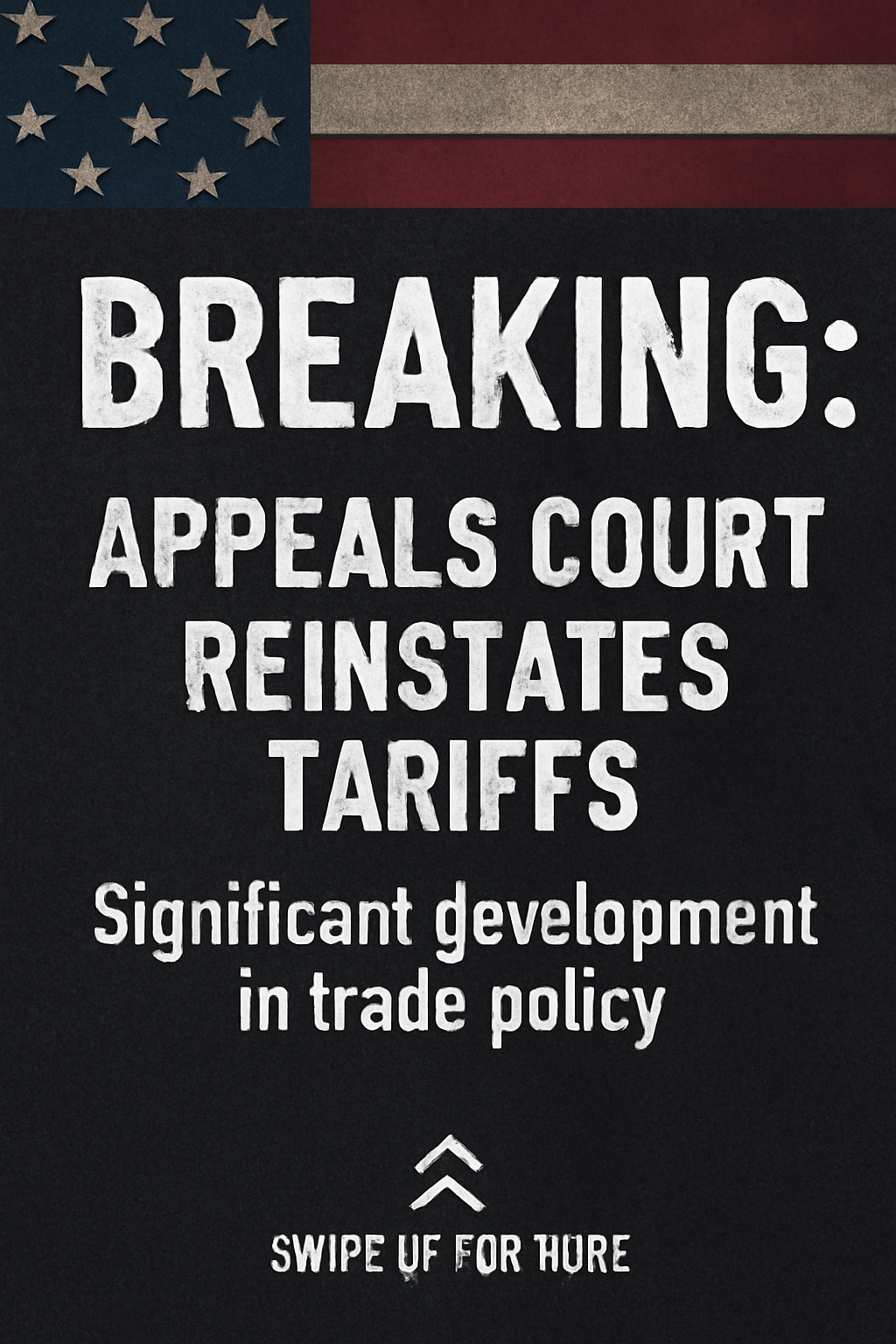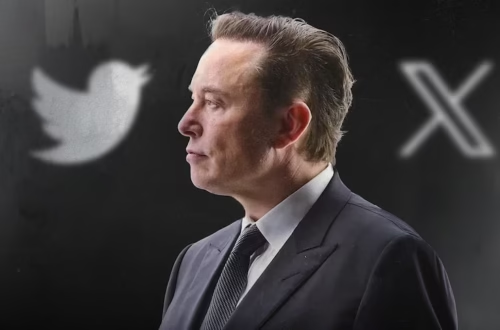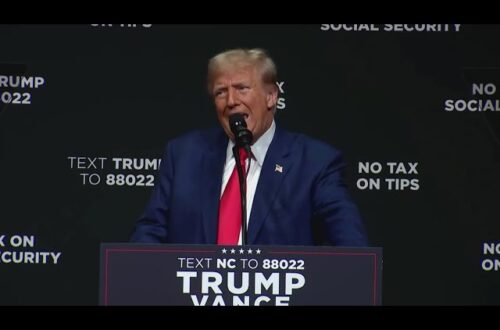A Major Victory for Trump’s Trade Policy
On May 29, 2025, the U.S. Court of Appeals for the Federal Circuit issued a temporary administrative stay, reinstating President Donald Trump’s sweeping tariffs after a lower court ruled them illegal. The decision, which pauses the U.S. Court of International Trade’s Wednesday ruling, allows the Trump administration to continue collecting tariffs on imports from numerous countries while the appeals process unfolds. This development has been celebrated by supporters as a significant win for Trump’s economic agenda, with social media posts on X proclaiming, “HUGE WIN: The Appeals Court has reinstated President Trump’s tariffs, BOOM!”
The reinstated tariffs include a 10% universal tariff on nearly all U.S. trading partners, 25% duties on goods from Canada and Mexico, and a 20% tariff on Chinese imports, justified by the administration as addressing trade deficits and drug trafficking. The stay, effective until at least mid-June, provides breathing room for the administration to pursue its trade strategy amid ongoing legal challenges.
[](https://www.politico.com/news/2025/05/29/federal-judge-temporarily-reinstates-trumps-tariffs-on-dozens-of-countries-00375001)
Background of the Tariff Controversy
Trump’s tariffs, introduced on April 2, 2025, as part of his “Liberation Day” trade initiative, aimed to reshape global commerce by imposing a 10% baseline tariff on imports from most countries, with higher “reciprocal” tariffs—up to 50%—on nations with trade deficits with the U.S. Additional tariffs targeted Canada, Mexico, and China, citing issues like fentanyl trafficking and illegal immigration. The administration invoked the International Emergency Economic Powers Act (IEEPA) of 1977 to justify these measures, claiming trade imbalances and border issues constituted a national emergency.
[](https://abcnews.go.com/Politics/wireStory/trumps-tariffs-now-court-knocked-122295994)On May 28, 2025, the U.S. Court of International Trade, in a unanimous ruling by a three-judge panel—including a Trump appointee—struck down these tariffs, arguing that the IEEPA did not grant the president “unbounded authority” to impose such levies without Congressional approval. The court emphasized that trade deficits do not constitute an “unusual and extraordinary threat” under the IEEPA, and the tariffs on Canada, Mexico, and China did not directly address the cited emergencies. The ruling, combined with a similar decision by U.S. District Judge Rudolph Contreras, ordered the administration to halt tariff collection within 10 days.
[](https://www.cbsnews.com/news/court-strikes-dow-trumps-liberation-day-tariffs-ruling-them-illegal/)[](https://www.nytimes.com/2025/05/29/us/politics/trump-tariffs-trade-strategy.html)
Appeals Court’s Temporary Stay
The Federal Circuit’s decision to grant an administrative stay came swiftly after the Trump administration appealed, arguing that halting the tariffs would cause “irreparable harm” to national security and ongoing trade negotiations. The court ordered plaintiffs—comprising five U.S.-based businesses and 12 state attorneys general—to respond by June 5, with the administration’s reply due by June 9. This timeline suggests the stay may remain in place through mid-June, allowing tariffs to continue pending a fuller review.
[](https://www.reuters.com/business/us-ruling-that-trump-tariffs-are-unlawful-stirs-relief-uncertainty-2025-05-29/)[](https://www.cbsnews.com/news/federal-appeals-court-temporarily-reinstates-trump-tariffs/)The administration had warned that without the stay, it would seek emergency relief from the Supreme Court, signaling its determination to preserve the tariffs. White House trade adviser Peter Navarro emphasized resilience, stating, “Even if we lose, we will do it another way,” hinting at alternative legal avenues like the Trade Act of 1974 or Section 232 of the Trade Expansion Act of 1962.
[](https://www.cnbc.com/2025/05/29/blocked-trump-tariffs-trade-court-appeal.html)[](https://www.bbc.com/news/articles/c93ywvl7yy5o)
Economic and Political Implications
Trump’s tariffs are a cornerstone of his economic agenda, aimed at boosting U.S. manufacturing and raising over $1 trillion in revenue. Supporters argue that the tariffs protect American industries and jobs, with posts on X celebrating the appeals court’s decision as a victory for “America First” policies. The reinstatement has bolstered confidence among Trump’s base, with users like @BigBreakingWire noting cautious market reactions but optimism among investors.
However, the tariffs have sparked significant controversy. Critics, including the Liberty Justice Center representing small businesses, argue that they impose heavy costs on American companies and consumers, who bear the brunt of higher import prices. A Reuters analysis estimates that the tariffs have cost businesses over $34 billion in lost sales and increased expenses. Nevada Attorney General Aaron Ford called the initial trade court ruling “a win for the rule of law and for Nevadans’ pocketbooks,” highlighting the economic burden.
[](https://www.reuters.com/business/us-ruling-that-trump-tariffs-are-unlawful-stirs-relief-uncertainty-2025-05-29/)[](https://abcnews.go.com/Politics/federal-court-trump-power-impose-tariffs-unilaterally/story?id=122290881)Financial markets have been volatile, with global stocks rallying after the trade court’s ruling but tempering gains following the appeals court’s stay. Analysts warn that prolonged uncertainty could disrupt supply chains, with companies rushing shipments to mitigate risks. Canadian Prime Minister Mark Carney welcomed the initial ruling, aligning with Canada’s view that the tariffs were unlawful.
[](https://apnews.com/article/trump-trade-tariffs-lawsuit-court-73cd7e1e8528336989f091b2b782360c)[](https://www.reuters.com/business/us-ruling-that-trump-tariffs-are-unlawful-stirs-relief-uncertainty-2025-05-29/)
Legal Challenges and Congressional Authority
The core issue in the tariff dispute is the balance of power between the president and Congress. The U.S. Constitution grants Congress the authority to regulate commerce and impose tariffs, but presidents have increasingly used executive powers to enact trade policies. The trade court’s ruling underscored that the IEEPA, intended for national emergencies, does not permit the president to bypass Congress for sweeping trade measures.
[](https://www.cbsnews.com/news/court-strikes-dow-trumps-liberation-day-tariffs-ruling-them-illegal/)Legal experts like Ilya Somin, who represented businesses in one of the lawsuits, remain optimistic that the trade court’s decision will be upheld, noting the bipartisan panel’s composition, including a Trump appointee. However, others, like Terry Haines of Pangaea Policy, suggest courts may defer to the president on national security grounds. The case is widely expected to reach the Supreme Court, especially given Trump’s assertion that the lower court’s ruling threatens “Presidential Power.”
[](https://www.bbc.com/news/articles/c93ywvl7yy5o)[](https://www.cnbc.com/2025/05/29/blocked-trump-tariffs-trade-court-appeal.html)
Alternative Paths for Tariffs
Even if the appeals court ultimately rules against the administration, Trump has options to reimpose tariffs. The Trade Act of 1974 allows tariffs up to 15% for 150 days to address trade deficits, while Section 232 of the Trade Expansion Act of 1962, used for steel, aluminum, and auto tariffs, could be expanded to other sectors after a Commerce Department investigation. The Wall Street Journal reported that the administration is considering a 15% tariff under the 1974 Act as a stopgap measure to buy time for more targeted schemes.
[](https://www.cbsnews.com/news/trump-tariffs-blocked-illegal-court-international-trade-ieepa-whats-next/)[](https://www.aljazeera.com/economy/2025/5/29/federal-appeals-court-temporarily-reinstates-trump-tariffs)These alternatives, however, are more limited and time-consuming, potentially delaying Trump’s trade agenda. The administration’s aggressive stance, backed by officials like Navarro and White House Press Secretary Karoline Leavitt, suggests it will pursue all avenues to maintain its tariff policy.
[](https://www.washingtonpost.com/politics/2025/05/29/live-updates-court-throws-up-latest-roadblock-trumps-policy-agenda/)
Global and Domestic Reactions
Internationally, the tariffs have strained relations with key trading partners. The 90-day pause on reciprocal tariffs was meant to facilitate negotiations, but the trade court’s initial ruling weakened the U.S. position, with countries like Canada and the EU questioning the tariffs’ legality. The appeals court’s stay restores some leverage, though ongoing lawsuits—over half a dozen challenging Trump’s authority—could prolong uncertainty.
[](https://abcnews.go.com/Politics/federal-court-trump-power-impose-tariffs-unilaterally/story?id=122290881)Domestically, the debate is polarized. Trump supporters, including lawmakers like Representative Andy Ogles, have criticized the trade court judges as “woke activists,” despite one being a Trump appointee. Conversely, business groups and Democratic-led states argue that the tariffs harm consumers and small businesses. The U.S. National Retail Federation highlighted the difficulty of planning amid legal uncertainty, urging a “clear, consistent, and strategic trade policy.”
[](https://www.newsweek.com/donald-trump-administration-tariffs-blocked-news-live-updates-2078430)[](https://www.cbc.ca/news/world/trump-tariffs-appeal-court-ruling-1.7547404)
Economic Risks and Market Impact
The tariffs’ reinstatement has reignited concerns about economic fallout. Economists warn that the levies could raise consumer prices and risk a recession, with Goldman Sachs noting potential inflation spikes. The trade court’s ruling had initially boosted global markets, but the appeals court’s stay led to cautious trading, with Asian stocks dipping and the dollar slipping.
[](https://time.com/7289394/trump-tariffs-uscit-court-international-trade-ruling-appeal-reactions-explainer/)Businesses face challenges in adjusting supply chains, with some accelerating shipments to preempt potential tariff hikes. The Nomura Holdings group noted that the government may owe refunds for tariffs collected under the IEEPA, though this obligation could persist even if alternative tariff measures are enacted.
[](https://www.nbcnews.com/business/business-news/trump-tariffs-court-ruling-which-tariffs-are-still-in-place-rcna209738)
Looking Ahead: The Path to the Supreme Court
The tariff battle is far from over. The Federal Circuit’s temporary stay is a procedural step, with a more comprehensive ruling expected after both sides submit briefs. Legal analysts anticipate the case will escalate to the Supreme Court, given its implications for executive power and trade policy. Trump’s public statements, calling the trade court’s decision a “Country-threatening” blow, underscore the administration’s intent to fight aggressively.
[](https://www.cnbc.com/2025/05/29/blocked-trump-tariffs-trade-court-appeal.html)The outcome will shape not only Trump’s trade agenda but also the broader balance of power between the executive and legislative branches. If the tariffs are upheld, they could solidify Trump’s strategy of using duties to reshape global trade. If struck down, the administration may face delays in implementing its economic vision, though alternative legal pathways remain viable.
Conclusion
The U.S. Court of Appeals for the Federal Circuit’s decision to temporarily reinstate President Trump’s tariffs marks a significant, albeit provisional, victory for his trade agenda. By pausing the U.S. Court of International Trade’s ruling, the appeals court has kept alive a key pillar of Trump’s economic strategy, which seeks to protect U.S. industries and address trade imbalances. However, ongoing legal challenges, economic uncertainties, and global trade tensions highlight the contentious nature of these tariffs. As the case heads toward a potential Supreme Court showdown, the debate over presidential authority and the economic impact of tariffs will continue to dominate national and international discourse.




